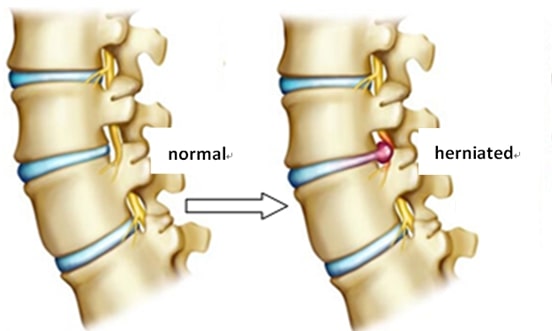
Causes of Lumbar Herniated Disc
Pain caused by a lumbar herniated disc can seem to occur suddenly, but it is usually the result of a gradual process.
The spinal discs in children have a high water content, which helps the discs stay flexible as they act as cushions between the vertebrae. Over time as part of the normal aging process, the discs begin to dry out. This leaves the disc’s tough outer ring more brittle and vulnerable to cracking and tearing from relatively mild movements, such as picking up a bag of groceries, twisting the lower back while swinging a golf club, or simply turning to get in the car.
A less common cause of lumbar herniated discs is a traumatic injury, such as a fall or car accident. An injury can put so much pressure on a disc in the lower back that it herniates.
Risk Factors for Lumbar Herniated Disc
Factors that may add to the risk of developing a lumbar herniated disc include:
- Age. The most common risk factor is being between the ages of 35 and 50. The condition rarely causes symptoms after age 80.
- Gender. Men have roughly twice the risk for lumbar herniated discs compared with women.
- Physically demanding work. Jobs that require heavy lifting and other physical labor have been linked to a greater risk of developing a lumbar herniated disc. Pulling, pushing, and twisting actions can add to risk if they’re done repeatedly.
- Obesity. Excess weight makes one more likely to experience a lumbar herniated disc and 12 times more likely to have the same disc herniate again, called a recurrent disc herniation, after a microdiscectomy surgery. Experts believe that carrying extra weight increases the stress on the lumbar spine, making people who are obese more prone to herniation.
- Smoking. Nicotine limits blood flow to spinal discs, which speeds up disc degeneration and hampers healing. A degenerated disc is less pliable, making it more likely to tear or crack, which can lead to a herniation. The medical literature is mixed on whether people who smoke are at greater risk for a new herniation following a discectomy.
- Family history. The medical literature has shown a hereditary tendency for disc degeneration, and disc degeneration is associated with an increased risk for a herniation. One extensive study found that a family history of lumbar herniated discs is the best predictor of a future herniation.
While the above factors all contribute to the higher risk of developing a symptomatic lumbar disc herniation, it is possible for anyone of any age to have a herniated disc. A disc can also herniate and/or become symptomatic for no known reason.
If you are suffering from pain, please contact our office at (516) 419-4480 or (718) 215-1888 to arrange an appointment with our Interventional Pain Management Specialist, Dr. Jeffrey Chacko.













